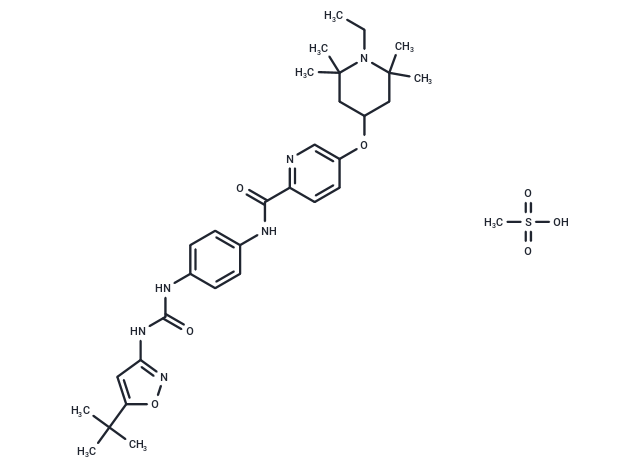Shopping Cart
Remove All Your shopping cart is currently empty
Your shopping cart is currently empty
AC710 Mesylate is a potent PDGFR inhibitor with dissociation constants (Kds) of 0.6 nM for FLT3, 1.57 nM for CSF1R, 1 nM for KIT, 1.3 nM for PDGFRα, and 1.0 nM for PDGFRβ.

| Pack Size | Price | USA Warehouse | Global Warehouse | Quantity |
|---|---|---|---|---|
| 25 mg | $1,520 | 1-2 weeks | 1-2 weeks | |
| 50 mg | $1,980 | 1-2 weeks | 1-2 weeks | |
| 100 mg | $2,500 | 1-2 weeks | 1-2 weeks |
| Description | AC710 Mesylate is a potent PDGFR inhibitor with dissociation constants (Kds) of 0.6 nM for FLT3, 1.57 nM for CSF1R, 1 nM for KIT, 1.3 nM for PDGFRα, and 1.0 nM for PDGFRβ. |
| Targets&IC50 | PDGFRβ:1 nM (kd), c-Kit:1 nM (kd), PDGFRα:1.3 nM (kd), FLT3:0.6 nM (kd), CSF1R:1.57 nM (kd) |
| In vivo | At a dosage of 0.3 mg/kg, AC710 temporarily inhibits tumor growth, which then quickly resumes. However, at dosages of 3 and 30 mg/kg, AC710 induces complete tumor regression, with the reduction in tumor volume remaining for an extended period post-treatment cessation. Furthermore, no loss of body weight is observed in AC710-treated animals across all dosages, suggesting good tolerability in mice. Efficacy of AC710 is also noted in a mouse collagen-induced arthritis (CIA) model, showing significant disease impact in a dose-dependent manner, with noticeable effects starting from a dosage as low as 3 mg/kg over a 15-day period (day 0-14). At higher doses (10 and 30 mg/kg), AC710 is as effective, if not more so, than dexamethasone in reducing joint swelling and inflammation when administered at a safe dose. |
| Animal Research | The antitumor efficacy of AC710 is assessed in a subcutaneous flank-tumor xenograft model in athymic nude mice using the MV4-11cell line. AC710 is dosed at 0.3, 3, and 30 mg/kg for 2 weeks. Tumor growth and body weight are monitored. |
| Molecular Weight | 658.81 |
| Formula | C32H46N6O7S |
| Cas No. | 1351522-05-8 |
| Smiles | O=C(NC1=NOC(=C1)C(C)(C)C)NC2=CC=C(C=C2)NC(=O)C3=NC=C(OC4CC(N(CC)C(C)(C)C4)(C)C)C=C3.O=S(=O)(O)C |
| Relative Density. | no data available |
| Storage | Powder: -20°C for 3 years | In solvent: -80°C for 1 year | Shipping with blue ice/Shipping at ambient temperature. |
| Size | Quantity | Unit Price | Amount | Operation |
|---|

Copyright © 2015-2026 TargetMol Chemicals Inc. All Rights Reserved.